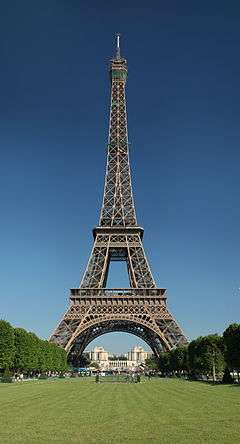Nonbuilding structure
A nonbuilding structure, also referred to simply as a structure, refers to any body or system of connected parts used to support a load that was not designed for continuous human occupancy. The term is used by architects, structural engineers, and mechanical engineers to distinctly identify built structures that are not buildings.[1]
Examples
- Aerial lift pylon
- Aqueduct (water supply)
- Arena
- Barriers[2]
- Blast furnaces
- Bleacher
- Boat lifts
- Brick kilns
- Bridges[3] and bridge-like structures (aqueducts, overpasses, trestles, viaducts, etc.)
- Bus shelters
- Canal
- Building canopies
- Carport
- Chimneys and flue-gas stacks
- Coke ovens
- Communications tower
- Covered bridges[3]
- Cranes
- Dams
- Dock (maritime)
- Dolphin (structure)
- Electricity grid
- Ferris wheels
- Ferry slip
- Flume
- Fortification
- Fractionating towers
- Gates[2]
- Handrails[2]
- Hayrack
- Hay barrack
- Headframe
- Infrastructure
- Marina
- Monuments
- Mining
- Parking structures
- Oil depot
- Offshore oil platforms (except for the production and housing facilities)
- Pavilions[2]
- Piers[3]
- Radio masts and towers
- Railroads
- Ramada (shelter)
- Roads
- Roller coasters
- Retaining walls
- Silos[3]
- Snow shed
- Stadium
- Storage tanks
- Street lights[2]
- Street signs[2]
- Swimming pools[3]
- Structures designed to support, contain or convey liquid or gaseous matter, including
- Cooling towers
- Distillation equipment and structural supports at chemical and petrochemical plants and oil refineries
- Tank farm
- Towers of some types
- Tramways and Aerial tramways
- Transmission towers
- Triumphal arch
- Tunnels
- Underwater habitat
- Water towers[3]
- Wharves[3]
Exceptions

Dulles Airport control tower
Some structures that are occupied periodically and would otherwise be considered nonbuilding structures are categorized as "buildings" for life and fire safety purposes:
See also
References
- ↑ International Code Council (2003). 2003 International Building Code. International Code Council. ISBN 1-892395-79-7.
- 1 2 3 4 5 6 Prasad, Deo K.. Designing with solar power: a source book for building integrated photovoltaics (BiPV). Mulgrave, Vic.: Images ;, 2005. Print.
- 1 2 3 4 5 6 7 Kunreuther, Howard, and Richard J. Roth. Paying the price the status and role of insurance against natural disasters in the United States. Washington, D.C.: Joseph Henry Press, 1998. Print.
This article is issued from Wikipedia - version of the Wednesday, February 03, 2016. The text is available under the Creative Commons Attribution/Share Alike but additional terms may apply for the media files.

